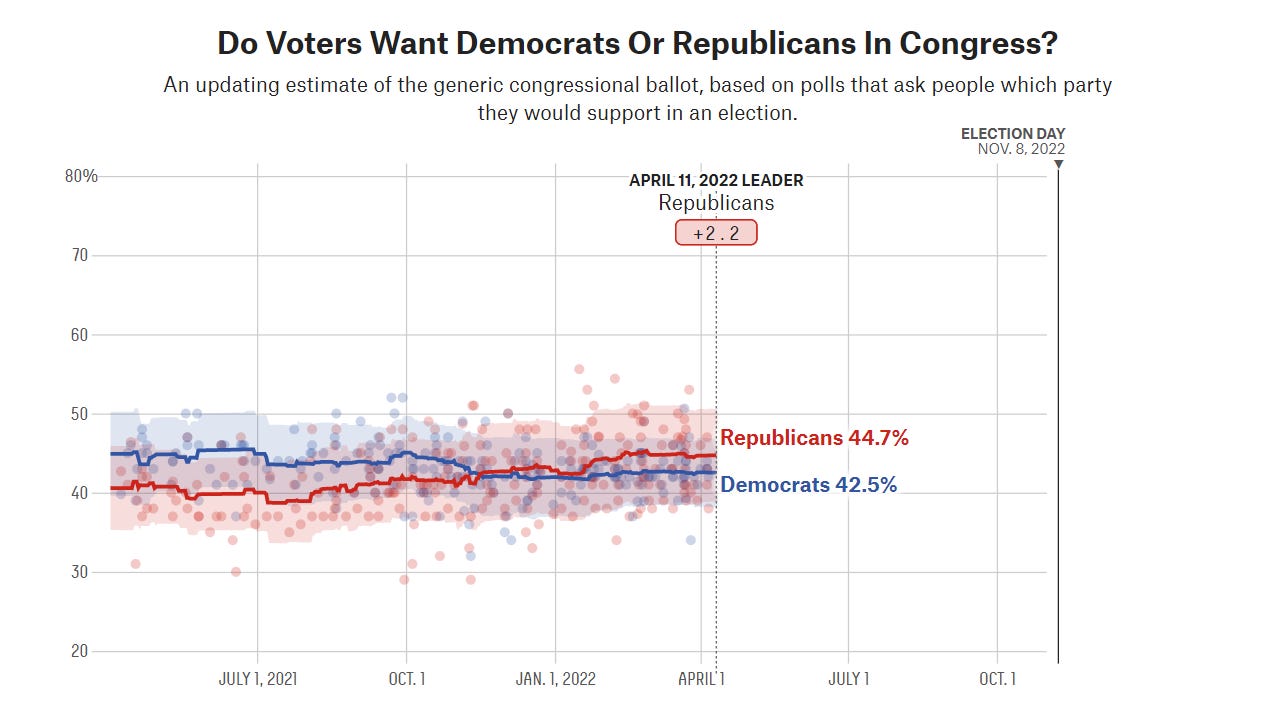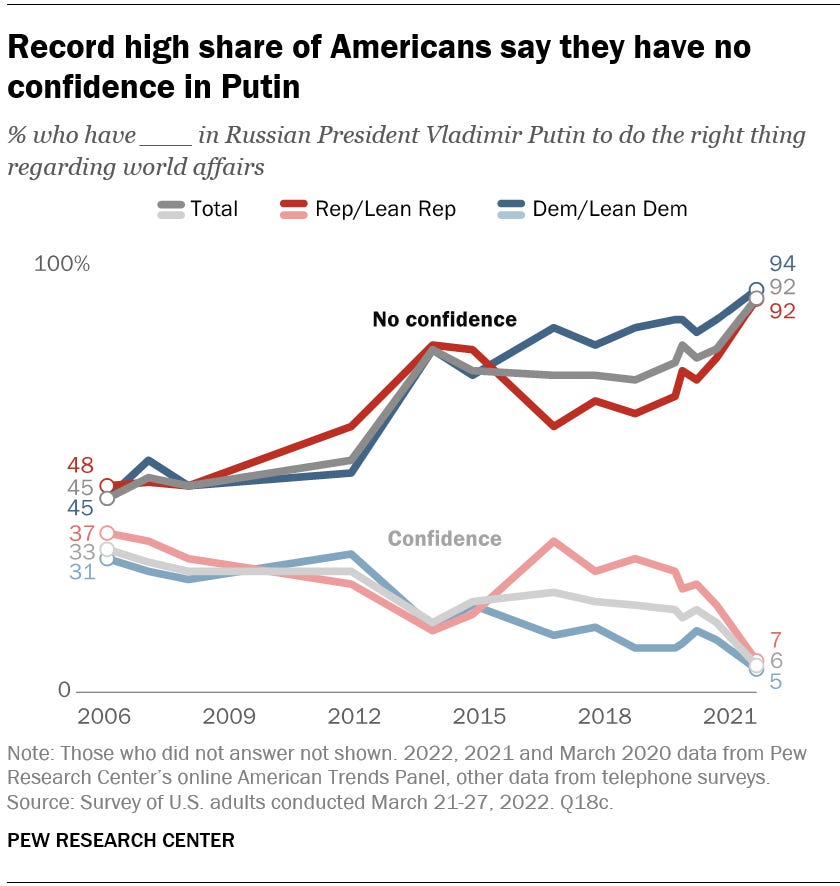Democrats need to run on the war
Their economic agenda has been stymied, so they should trumpet their strength on foreign affairs
So, let’s begin this with the standard disclaimer that I’m not a political pundit. Usually I leave this sort of analysis to the David Shors of the world. But I do care about electing Democrats, both because they’re much more likely to address the issues I care about (raising investment, building a better welfare state, climate change) and because the GOP is still very compromised by the Trumpist faction. And it seems to me that Democrats are headed for a beating in the 2022 Congressional midterm elections. So I want to think about ways the Dems could turn that around in the next few months. (If this is too nakedly partisan for your taste, or if this isn’t the kind of thing you come to Noahpinion to read, then my apologies in advance.)
Why Dems are in trouble
First let’s talk about how much trouble the Dems seem to be in. Here is FiveThirtyEight’s generic ballot polling average:
You can see that Dems were actually ahead until late 2021, then it switched. That’s not a good sign. But even more worrying is the enthusiasm gap. Republicans are fired up; Dems are not.


There are at least two big structural factors working against Democrats here. First, the Senate is currently biased toward the GOP, because the GOP is more rural, and rural states get disproportionate representation in the Senate (and no, tweeting “abolish the Senate” is not going to fix this, or help in any way, it will just make you look obnoxious). Second, “thermostatic politics” means that midterm voters generally have a preference for the party that isn’t in control of the Presidency. Simon Bazelon, writing at Matt Yglesias’ blog, has a helpful chart that shows this very clearly:
Luckily a third danger has been averted. Democrats did well in Congressional redistricting, reversing much of the pro-GOP tilt in the House that had resulted from previous rounds of gerrymandering:


But thermostatic politics and the Senate’s current rightward bias will be enough to sink Dems if they don’t come up with some very powerful appeal, very soon.
Why Dems’ normal appeals aren’t working
Unfortunately, the Dems’ typical appeals don’t seem to be working. The Dems’ basic selling point is economic: Vote for us, and we’ll make sure you have a job and a social safety net. On the jobs part, Dems have certainly delivered (or at least stood back and refrained from interfering while the economy delivered).
They should trumpet this achievement much more loudly and confidently. Currently, people don’t seem to realize how good the job market is. But if the actual fact of a booming job market hasn’t penetrated Americans’ consciousness yet, my guess is that Americans are simply expressing their general dissatisfaction with the economy. And it’s pretty clear what they’re mad about: Inflation. Or to be more precise, falling real wages.
To the average voter — who has a job and has had a job since Biden came into office — the fact that unemployed people somewhere out there are finding work is probably overshadowed by the fact that they themselves are becoming poorer by the month. Nobody likes to become poorer by the month.
Of course, there are other sources of income besides wages. One is government benefits. And Biden started out his presidency by passing a massive expanded child tax credit that was delivered to most families in America. That was a great policy, but Americans turned against it. Polls in late 2021 showed that although Americans generally appreciated that the tax credit had been passed, a very substantial majority didn’t want to make it permanent. And so the program was allowed to expire. Americans seem to be in a mindset of scarcity right now — so worried about government benefits going to undeserving people that they’re willing to cancel benefits for themselves. In any case, whether because of the child tax credit’s unpopularity or its cancellation — or because of other factors entirely — Dems have lost their polling advantage among recipients of the tax credit:


As for other Democratic initiatives, they’ve been stymied by a small handful of conservative Democrats in the Senate. That has unfortunately deprived Dems of a more lengthy policy record on which to run.
So economic appeals just aren’t working. What about cultural appeals? It has been clear for a while now that “defund the police” is both dead on arrival as a policy — most cities have increased police budgets in the wake of a massive crime wave — and toxic as a slogan. And a campaign against “critical race theory” is widely credited with propelling Glenn Youngkin to victory in last year’s Virginia gubernatorial race.
Dems may have more success raising the alarm over the new social conservative pushback — bills to stop classrooms from teaching kids that homosexuality exists, abortion bans, and so on. I encourage Dems to run on these issues. But more is needed, especially in the wake of the huge flaming disaster that was the “defund” campaign.
The broad appeal of the struggle against Putin
What else could Democrats run on? Well, if there’s one thing that unites Americans right now, it’s opposition to Vladimir Putin and his brutal invasion of Ukraine.
So if opposition to Putin and his invasion is bipartisan, how can Dems run on it?
Two ways. First, Joe Biden is President right now, and Dems control Congress. Thus, the actions that the U.S. has taken to support Ukraine — weapons shipments, sanctions, and so forth — can be claimed as Democratic initiatives. This is a purely positive message — it doesn’t depend on bashing the GOP, it just requires Dems to point in the direction of Ukraine’s military successes, and the uniting of Europe against Putin, and to note that Democratic leaders played some part in that.
But in addition, there is still a pro-Putin faction of the GOP, especially within the Trumpist wing of the party. Yes, most Republicans in Congress have supported the effort against Russia, and this is to their credit. But when there was a vote in the House on stripping Russia of its “most favored nation” trading status, seven Republicans and only two Democrats voted nay:

And a few days ago, nearly 1/3 of House Republicans voted against a resolution expressing support for NATO.
In other words, support for Putin is still mostly a phenomenon on the Trumpist Right. Yes, there is a small leftist faction with the Democratic party who thinks that acceding to Russia’s invasion is somehow an act of “peace”. This faction is very loud and obnoxious on Twitter (though they have been marginally quieter of late). But in terms of actual elected leaders, they are nearly without representation, while the Trumpists who support Putin’s fascist stylings are far more numerous in the House. (If you think I’m making an unfair or exaggerated accusation in that last sentence, don’t take it from me — take it from the Wall Street Journal’s op-ed page.) It wasn’t too long ago that Tucker Carlson was defending Putin outright.
Dems can use this Putinist faction of the GOP as a foil, against which to contrast their own resolute and effective stand against Russian aggression. That is the kind of patriotic liberal narrative that broadly appeals to the American electorate.
In fact, there’s a historical precedent for this sort of messaging: World War 2. In the late 1930s, conservative Southern Democrats allied with Republicans to kill FDR’s plans for an additional raft of New Deal initiatives. From 1937 to 1941, FDR got relatively little done. But FDR remained a highly popular President due to the “rally ‘round the flag” effect of World War 2.
Now, it’s not clear that this worked in the midterm elections. The 1942 midterms, right after the war began, featured extremely low turnout and saw the Dems lose a few seats to the GOP. You can argue that without the war the carnage would have been far worse, but a loss is a loss.
The more hopeful precedent, though, is 2002. If you’ll look at the chart above, you’ll notice that the 2002 midterms are the one huge exception the rule that the President’s party loses support in the midterms. The reason, of course, was 9/11, which rallied the American people around the President and his party. Of course the attack on Ukraine is not like 9/11; American soil remains untouched. But the massive outpouring of negative sentiment against Putin might mean that Americans (accurately) see Putin as an even bigger threat to our country, and to global stability, than al Qaeda was.
So Dems should amp up the Ukraine war, and the struggle against Russian aggression, in their midterm messaging. I’m not saying it’s the only thing they should run on, and I’m not saying that this will necessarily be enough to win with the deck of thermomstatic politics stacked so strongly against them. But it’s one of the best issues they have, and they should be talking about it more.











Yeah, being even more hawkish against Putin probably is the best electoral strategy for the Dems.
Problems I see are that:
1. I don't trust Dems to act smartly in election strategy. They seem to care more about winning faculty lounge debates than votes (still majority working class), sadly enough.
2. A portion of the GOP are Putin bootlickers, but they also have an extremely hawkish wing (Rubio, Graham, etc.) and the GOP has owned that brand for several decades now so stealing that away would be tough.
3. The autocrat-loving (America-hating/head-in-the-sands) Left may be tiny electorally but have an outsized voice and it would be easy for the GOP to tie all Dems to the Lefty fringe. Dems _should_ tie the GOP to Putin in return, but again, that requires Dems to actually be good at this electioneering thing. And even then, they may struggle as much as Macron vs. LePen.
I'm 31 years old now. We've been at war, in essence, for 20 of them. There seems to be a constant drumbeat warning of us of another enemy just around the corner - Al Qaeda, The Taliban, Iraq, Iran, North Korea, China, Russia, etc. - while little has been done at home. It's not to say what's going on abroad isn't terrible, just that I think most people, especially the young, are pretty tired of the war beat and are looking for something different.